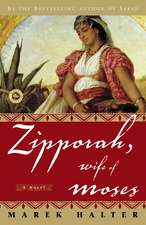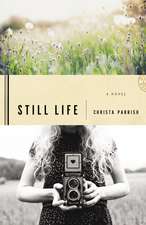Sarah: Canaan Trilogy, cartea 01
Autor Marek Halteren Limba Engleză Paperback – 31 mar 2005 – vârsta de la 14 până la 18 ani
Many years later, Abram returns to Ur and discovers that the lost, rebellious girl from the marsh has been transformed into a splendid woman—the high priestess of the goddess Ishtar. But Sarah gives up her exalted life to join Abram’s tribe and follow the one true God, an invisible deity who speaks only to Abram. It is then that her journey truly begins.
From the great ziggurat of Ishtar to the fertile valleys of Canaan to the bedchamber of the mighty Pharaoh himself, Sarah’s story reveals an ancient world full of beauty, intrigue, and miracles.
Preț: 112.52 lei
Nou
Puncte Express: 169
Preț estimativ în valută:
21.53€ • 22.48$ • 17.82£
21.53€ • 22.48$ • 17.82£
Carte disponibilă
Livrare economică 14-28 martie
Preluare comenzi: 021 569.72.76
Specificații
ISBN-13: 9781400052783
ISBN-10: 1400052785
Pagini: 325
Ilustrații: 1 MAP
Dimensiuni: 133 x 205 x 19 mm
Greutate: 0.25 kg
Editura: Three Rivers Press (CA)
Seria Canaan Trilogy
ISBN-10: 1400052785
Pagini: 325
Ilustrații: 1 MAP
Dimensiuni: 133 x 205 x 19 mm
Greutate: 0.25 kg
Editura: Three Rivers Press (CA)
Seria Canaan Trilogy
Notă biografică
Marek Halter was born in Poland in 1936. His family escaped the Warsaw Ghetto and settled in France. He is the author of several internationally acclaimed bestselling novels, including The Book of Abraham. Halter’s second and third novels about women of the Bible, Zipporah and Lilah, will be published in 2005 and 2006, respectively. He lives in Paris.
Extras
The Bridal Blood
Sarai clumsily pushed aside the curtain that hung in the doorway and ran to the middle of the brick terrace that overlooked the women's courtyard. Dawn was breaking, and there was just enough light for her to see the blood on her hands. She closed her eyes to hold back the tears.
She did not need to look down to know that her tunic was stained. She could feel the fine woollen cloth sticking wetly to her thighs and knees.
Here it was again! A sharp pain, like a demon's claw moving between her hips! She stood frozen, her eyes half closed. The pain faded as suddenly as it had come.
Sarai held out her soiled hands in front of her. She should have implored Inanna, the almighty Lady of Heaven, but no word passed her lips. She was petrified. Fear, disgust, and denial mingled in her mind.
Only a moment ago, she had woken suddenly, her belly ringed with pain, and put her hands between her thighs. Into this blood that was flowing out of her for the first time. The bridal blood. The blood that creates life.
It had not come as she had been promised it would. It was not like dew or honey. It flowed as if from an invisible wound. In a moment of panic, she had seen herself being emptied of blood like a ewe under the sacrificial knife.
She had reacted like a silly child, and now she felt ashamed. But her terror had been so great that she had sat up moaning on her bed and rushed outside.
Now, in the growing light of day, she looked at her bloodstained hands as if they did not belong to her. Something strange was happening in her body, something that had obliterated her happy childhood at a stroke.
Tomorrow, and the day after tomorrow, and all the days and years to come, would be different. She knew what awaited her. What awaited every girl in whom the bridal blood flowed. Her handmaid Sililli and all the other women in the household would laugh. They would dance and sing and give thanks to Nintu, the Midwife of the World.
But Sarai felt no joy. At that moment, she wished her body was someone else's.
She took a deep breath. The smell of the night fires floating in the cool air of early morning calmed her a little. The coolness of the bricks beneath her bare feet did her good. There was no noise in the house or the gardens. Not even the flight of a bird. The whole city seemed to be holding its breath, waiting for the sun to burst forth. For the moment it was still hidden on the other side of the world, but the ocher light that preceded it was spreading over the horizon like oil.
Abruptly Sarai turned and went back through the curtain into her bedchamber. In the dim light, it was just possible to make out the big bedstead where Nisaba and Lillu lay sleeping. Without moving, Sarai listened to her sisters' regular breathing. At least she had not woken them.
She advanced cautiously to her own bed. She wanted to sit down, but hesitated.
She thought of the advice Sililli had given her. Change your tunic, take off the sheet, roll the soiled straw in it, go to the door and take some balls of wool dipped in sweet oil, wash your thighs and genitals with them, then take some other balls, scented with essence of terebinth, and use them to absorb the blood. All she had to do was perform a few simple actions. But she couldn't. She didn't know why, but she couldn't bear even the thought of touching herself.
Anger was beginning to replace fear. What if Nisaba and Lillu discovered her and roused the whole household, crying out across the men's courtyard, "Sarai is bleeding, Sarai has the bridal blood!"
That would be the most disgusting thing of all.
Why did the blood running between her thighs make her more adult? Why, at the same time as she gained the freedom to speak, was she going to lose the freedom to act? For that was what was going to happen. Now, in exchange for a few silver shekels or a few measures of barley, her father could give her to a man. A stranger she might have to hate for the rest of her days. Why did things have to happen that way? Why not another way?
Sarai tried hard to dismiss this chaos of thoughts, this mixture of sadness and anger, but she couldn't. She couldn't even remember a single word of the prayers Sililli had taught her. It was as if a demon had banished them from her heart and mind. Lady Moon would be furious. She would send down a curse on her.
Anger and denial swept through her again. She couldn't stay here in the dark. But she didn't want to wake Sililli. Once Sililli took charge, things would really start.
She had to flee. To flee beyond the wall that enclosed the city, perhaps as far as the bend in the Euphrates, where the labyrinth of the lower city and the reedy lagoons stretched over dozens of *s. That was another world, a fascinating but hostile world, and Sarai wasn't brave enough to go there. Instead, she took refuge in the huge garden, which was full of a hundred kinds of trees and flowers and vegetables and surrounded by a wall that in places was higher than the highest rooms. She hid in a tamarisk grove clinging to the oldest part of the wall, where sun, wind, and rain had, in places, dissolved the stack of bricks and reduced it to a hard ocher dust. When the tamarisks were in bloom, their huge pink flowers spread like luxuriant hair over the wall and could be seen clear across the city. They had become the distinguishing feature of the house of Ichbi Sum-Usur, son of Ella Dum-tu, Lord of Ur, merchant and high-ranking official in the service of King Amar-Sin, who ruled the empire of Ur by the will of almighty Ea.
"SARAI! Sarai!!"
She recognized the voices: Lillu's piercing shriek and Sililli's more muted and anxious tones. Some of the handmaids had already searched the garden, but finding nothing, had gone away again.
Silence returned, except for the murmur of the water flowing in the irrigation channels and the chirping of the birds.
From where she was, Sarai could see everything but could not be seen. Her father's house was one of the most beautiful in the royal city. It was shaped like a hand enclosing a huge rectangular central courtyard, which was reached through the main entrance. At either end, the courtyard was separated by two green-and-yellow brick buildings, open only for receptions and celebrations, and by two smaller courtyards, the women's and the men's. The men's quarters, with their white staircases, overhung the temple of the family's ancestors, the storehouses, and the room where her father's scribes worked, while the women's chambers were built above the kitchens, the handmaids' dormitories, and the chamber of blood. Both opened onto a broad terrace, shaded by bowers of vines and wisteria, with a view of the gardens. The terrace allowed the men to join the women at night without having to cross the courtyards.
From her grove, Sarai could also see a large part of the city, and, towering over it like a mountain, the ziggurat, the Sublime Platform. Not a day went by that she did not come here to admire the gardens of the ziggurat. They were a lake of foliage between earth and sky, full of every flower and every tree the gods had sown on the earth. From this riot of greenery emerged the steps, covered in black-and-white ceramics, that led up to the Sublime Bedchamber, with its lapis lazuli columns and walls. There, once a year, the king of Ur was united with the Lady of Heaven.
Today, though, she had eyes only for what was happening in the house. Everything seemed to have calmed down. Sarai had the impression they had stopped searching for her. When the handmaids had appeared earlier in the garden, she had been tempted to join them. But now it was too late for her to leave her hiding place. With every hour that passed, she was more at fault. If anyone saw her in this state, they would scream with fright and turn away, shielding their eyes as if they had seen a woman possessed by demons. It was unthinkable that she could show herself like this to the women. It would be a blemish on her father's house. She had to stay here and wait until nightfall. Only then could she perform her ablutions in the garden's irrigation basin. After that, she would go and ask Sililli for forgiveness. With enough tears, and enough terror in her voice, to mollify her.
Until then she had to forget her thirst and the heat that was gradually transforming the still air into a strange miasma of dry dust.
SHE stiffened when she heard the shouts.
"Sarai! Answer me, Sarai! I know you're there! Do you want to die today, with the shame of the gods on you?"
She recognized the thick calves, the yellow-and-white tunic with its black border instantly.
"Sililli?"
"Who else were you expecting?" the handmaid retorted, in an angry whisper.
"How did you manage to find me?"
Sililli took a few steps back. "Stop your chattering," she said, lowering her voice even more, "and come out of there right now before anyone sees you."
"You mustn't look at me," Sarai warned.
She emerged from the copse, straightening up with difficulty, her muscles aching from her long immobility.
Sililli stifled a cry. "Forgive her, almighty Ea! Forgive her!"
Sarai did not dare look Sililli in the face. She stared down at her short, round shadow on the ground, and saw her raise her arms to heaven then hug them to her bosom.
"Almighty Lady of Heaven," Sililli muttered, in a choked voice, "forgive me for having seen her soiled face and hands! She is only a child, holy Inanna. Nintu will soon purify her."
Sarai restrained herself from rushing into the handmaid's arms. "I'm so sorry," she said, in a barely audible whisper. "I didn't do as you told me to. I couldn't."
She did not have time to say more. A linen sheet was flung over her, covering her from head to foot, and Sililli's hands clasped her waist. Now Sarai no longer needed to hold back, and she leaned against the firm, fleshy body of the woman who had not only been her nurse, but had also been like a mother to her.
"Yes, you silly little thing," Sililli whispered in her ear through the linen, the anger gone from her voice, the tremor of fear still there, "I've known about this hiding place for a long time. Since the first time you came here! Did you think you could escape your old Sililli? In the name of almighty Ea, what possessed you? Did you think you could hide from the sacred laws of Ur? To go where? To remain at fault your whole life? Oh, my little girl! Why didn't you come to see me? Do you think you're the first to be afraid of the bridal blood?"
Sarai wanted to say something to justify herself, but Sililli placed a hand on her mouth.
"No! You can tell me everything later. Nobody must see us here. Great Ea! Who knows what would happen if you were seen like this? Your aunts already know you've become a woman. They're waiting for you in the chamber of blood. Don't be afraid, they won't scold if you arrive before the sun goes down. I've brought you a pitcher of lemon water and terebinth bark so you can wash your hands and face. Now throw your soiled tunic under the tamarisk. I'll come back later to burn it. Wrap yourself in this linen veil. Make sure you avoid your sisters, or nobody will be able to stop those pests from going and telling your father everything."
Sarai felt Sililli's hand stroking her cheek through the cloth.
"Do what I ask of you. And hurry up about it. Your father must know nothing of your escapade."
"Sililli."
"What now?" Sililli said.
"Will you be there, too? In the chamber of blood, I mean."
"Of course. Where else should I be?"
WASHED and scented, her linen veil knotted over her left shoulder, Sarai reached the women's courtyard without meeting a soul. She had gathered all her courage to approach the mysterious door she had never gone anywhere near.
From the outside, the chamber of blood was nothing but a long white wall with no windows that took up almost the entire space below the quarters reserved for the women: Ichbi's wife, sisters, daughters, female relatives, and handmaids. The door was cleverly concealed by a cane portico covered with a luxuriant ocher-flowered bignonia, so that it was possible to cross the women's courtyard in all directions without ever seeing it.
Sarai went through the portico. Before her was a small double door of thick cedarwood, the bottom half painted blue and the top half red: the door of the chamber of blood.
Sarai had only a few steps to take to open this door. But she did not move. Invisible threads were holding her back. Was it fear?
Like all girls her age, she had heard many stories about the chamber of blood. Like all girls her age, she knew that once a month women went and shut themselves in there for seven days. During full moons, they would gather there to make vows and petitions that could be said nowhere else. It was a place where women laughed, wept, ate honey and cakes and fruit, shared their dreams and secrets--and sometimes died in agony. Occasionally, through the thick walls, Sarai had heard the screams of a woman in labor. She had seen women go in there, happy with their big bellies, and not come out again. No men ever entered, or even tried to peer inside. Anyone curious or foolhardy enough to do so would carry the stain of their offense down with them to the hell of Ereshkigal.
But in truth, she knew very little of what went on there. She had heard the most absurd rumors, whispered by her sisters and cousins. Unopened girls did not know what happened to those who entered the chamber of blood for the first time, and none of the munus, the opened women, over divulged the secret.
Her day had come. Who could go against the will of the gods? Sililli was right. It was time. She could not remain at fault any longer. She must have the courage to open that door.
From the Hardcover edition.
Sarai clumsily pushed aside the curtain that hung in the doorway and ran to the middle of the brick terrace that overlooked the women's courtyard. Dawn was breaking, and there was just enough light for her to see the blood on her hands. She closed her eyes to hold back the tears.
She did not need to look down to know that her tunic was stained. She could feel the fine woollen cloth sticking wetly to her thighs and knees.
Here it was again! A sharp pain, like a demon's claw moving between her hips! She stood frozen, her eyes half closed. The pain faded as suddenly as it had come.
Sarai held out her soiled hands in front of her. She should have implored Inanna, the almighty Lady of Heaven, but no word passed her lips. She was petrified. Fear, disgust, and denial mingled in her mind.
Only a moment ago, she had woken suddenly, her belly ringed with pain, and put her hands between her thighs. Into this blood that was flowing out of her for the first time. The bridal blood. The blood that creates life.
It had not come as she had been promised it would. It was not like dew or honey. It flowed as if from an invisible wound. In a moment of panic, she had seen herself being emptied of blood like a ewe under the sacrificial knife.
She had reacted like a silly child, and now she felt ashamed. But her terror had been so great that she had sat up moaning on her bed and rushed outside.
Now, in the growing light of day, she looked at her bloodstained hands as if they did not belong to her. Something strange was happening in her body, something that had obliterated her happy childhood at a stroke.
Tomorrow, and the day after tomorrow, and all the days and years to come, would be different. She knew what awaited her. What awaited every girl in whom the bridal blood flowed. Her handmaid Sililli and all the other women in the household would laugh. They would dance and sing and give thanks to Nintu, the Midwife of the World.
But Sarai felt no joy. At that moment, she wished her body was someone else's.
She took a deep breath. The smell of the night fires floating in the cool air of early morning calmed her a little. The coolness of the bricks beneath her bare feet did her good. There was no noise in the house or the gardens. Not even the flight of a bird. The whole city seemed to be holding its breath, waiting for the sun to burst forth. For the moment it was still hidden on the other side of the world, but the ocher light that preceded it was spreading over the horizon like oil.
Abruptly Sarai turned and went back through the curtain into her bedchamber. In the dim light, it was just possible to make out the big bedstead where Nisaba and Lillu lay sleeping. Without moving, Sarai listened to her sisters' regular breathing. At least she had not woken them.
She advanced cautiously to her own bed. She wanted to sit down, but hesitated.
She thought of the advice Sililli had given her. Change your tunic, take off the sheet, roll the soiled straw in it, go to the door and take some balls of wool dipped in sweet oil, wash your thighs and genitals with them, then take some other balls, scented with essence of terebinth, and use them to absorb the blood. All she had to do was perform a few simple actions. But she couldn't. She didn't know why, but she couldn't bear even the thought of touching herself.
Anger was beginning to replace fear. What if Nisaba and Lillu discovered her and roused the whole household, crying out across the men's courtyard, "Sarai is bleeding, Sarai has the bridal blood!"
That would be the most disgusting thing of all.
Why did the blood running between her thighs make her more adult? Why, at the same time as she gained the freedom to speak, was she going to lose the freedom to act? For that was what was going to happen. Now, in exchange for a few silver shekels or a few measures of barley, her father could give her to a man. A stranger she might have to hate for the rest of her days. Why did things have to happen that way? Why not another way?
Sarai tried hard to dismiss this chaos of thoughts, this mixture of sadness and anger, but she couldn't. She couldn't even remember a single word of the prayers Sililli had taught her. It was as if a demon had banished them from her heart and mind. Lady Moon would be furious. She would send down a curse on her.
Anger and denial swept through her again. She couldn't stay here in the dark. But she didn't want to wake Sililli. Once Sililli took charge, things would really start.
She had to flee. To flee beyond the wall that enclosed the city, perhaps as far as the bend in the Euphrates, where the labyrinth of the lower city and the reedy lagoons stretched over dozens of *s. That was another world, a fascinating but hostile world, and Sarai wasn't brave enough to go there. Instead, she took refuge in the huge garden, which was full of a hundred kinds of trees and flowers and vegetables and surrounded by a wall that in places was higher than the highest rooms. She hid in a tamarisk grove clinging to the oldest part of the wall, where sun, wind, and rain had, in places, dissolved the stack of bricks and reduced it to a hard ocher dust. When the tamarisks were in bloom, their huge pink flowers spread like luxuriant hair over the wall and could be seen clear across the city. They had become the distinguishing feature of the house of Ichbi Sum-Usur, son of Ella Dum-tu, Lord of Ur, merchant and high-ranking official in the service of King Amar-Sin, who ruled the empire of Ur by the will of almighty Ea.
"SARAI! Sarai!!"
She recognized the voices: Lillu's piercing shriek and Sililli's more muted and anxious tones. Some of the handmaids had already searched the garden, but finding nothing, had gone away again.
Silence returned, except for the murmur of the water flowing in the irrigation channels and the chirping of the birds.
From where she was, Sarai could see everything but could not be seen. Her father's house was one of the most beautiful in the royal city. It was shaped like a hand enclosing a huge rectangular central courtyard, which was reached through the main entrance. At either end, the courtyard was separated by two green-and-yellow brick buildings, open only for receptions and celebrations, and by two smaller courtyards, the women's and the men's. The men's quarters, with their white staircases, overhung the temple of the family's ancestors, the storehouses, and the room where her father's scribes worked, while the women's chambers were built above the kitchens, the handmaids' dormitories, and the chamber of blood. Both opened onto a broad terrace, shaded by bowers of vines and wisteria, with a view of the gardens. The terrace allowed the men to join the women at night without having to cross the courtyards.
From her grove, Sarai could also see a large part of the city, and, towering over it like a mountain, the ziggurat, the Sublime Platform. Not a day went by that she did not come here to admire the gardens of the ziggurat. They were a lake of foliage between earth and sky, full of every flower and every tree the gods had sown on the earth. From this riot of greenery emerged the steps, covered in black-and-white ceramics, that led up to the Sublime Bedchamber, with its lapis lazuli columns and walls. There, once a year, the king of Ur was united with the Lady of Heaven.
Today, though, she had eyes only for what was happening in the house. Everything seemed to have calmed down. Sarai had the impression they had stopped searching for her. When the handmaids had appeared earlier in the garden, she had been tempted to join them. But now it was too late for her to leave her hiding place. With every hour that passed, she was more at fault. If anyone saw her in this state, they would scream with fright and turn away, shielding their eyes as if they had seen a woman possessed by demons. It was unthinkable that she could show herself like this to the women. It would be a blemish on her father's house. She had to stay here and wait until nightfall. Only then could she perform her ablutions in the garden's irrigation basin. After that, she would go and ask Sililli for forgiveness. With enough tears, and enough terror in her voice, to mollify her.
Until then she had to forget her thirst and the heat that was gradually transforming the still air into a strange miasma of dry dust.
SHE stiffened when she heard the shouts.
"Sarai! Answer me, Sarai! I know you're there! Do you want to die today, with the shame of the gods on you?"
She recognized the thick calves, the yellow-and-white tunic with its black border instantly.
"Sililli?"
"Who else were you expecting?" the handmaid retorted, in an angry whisper.
"How did you manage to find me?"
Sililli took a few steps back. "Stop your chattering," she said, lowering her voice even more, "and come out of there right now before anyone sees you."
"You mustn't look at me," Sarai warned.
She emerged from the copse, straightening up with difficulty, her muscles aching from her long immobility.
Sililli stifled a cry. "Forgive her, almighty Ea! Forgive her!"
Sarai did not dare look Sililli in the face. She stared down at her short, round shadow on the ground, and saw her raise her arms to heaven then hug them to her bosom.
"Almighty Lady of Heaven," Sililli muttered, in a choked voice, "forgive me for having seen her soiled face and hands! She is only a child, holy Inanna. Nintu will soon purify her."
Sarai restrained herself from rushing into the handmaid's arms. "I'm so sorry," she said, in a barely audible whisper. "I didn't do as you told me to. I couldn't."
She did not have time to say more. A linen sheet was flung over her, covering her from head to foot, and Sililli's hands clasped her waist. Now Sarai no longer needed to hold back, and she leaned against the firm, fleshy body of the woman who had not only been her nurse, but had also been like a mother to her.
"Yes, you silly little thing," Sililli whispered in her ear through the linen, the anger gone from her voice, the tremor of fear still there, "I've known about this hiding place for a long time. Since the first time you came here! Did you think you could escape your old Sililli? In the name of almighty Ea, what possessed you? Did you think you could hide from the sacred laws of Ur? To go where? To remain at fault your whole life? Oh, my little girl! Why didn't you come to see me? Do you think you're the first to be afraid of the bridal blood?"
Sarai wanted to say something to justify herself, but Sililli placed a hand on her mouth.
"No! You can tell me everything later. Nobody must see us here. Great Ea! Who knows what would happen if you were seen like this? Your aunts already know you've become a woman. They're waiting for you in the chamber of blood. Don't be afraid, they won't scold if you arrive before the sun goes down. I've brought you a pitcher of lemon water and terebinth bark so you can wash your hands and face. Now throw your soiled tunic under the tamarisk. I'll come back later to burn it. Wrap yourself in this linen veil. Make sure you avoid your sisters, or nobody will be able to stop those pests from going and telling your father everything."
Sarai felt Sililli's hand stroking her cheek through the cloth.
"Do what I ask of you. And hurry up about it. Your father must know nothing of your escapade."
"Sililli."
"What now?" Sililli said.
"Will you be there, too? In the chamber of blood, I mean."
"Of course. Where else should I be?"
WASHED and scented, her linen veil knotted over her left shoulder, Sarai reached the women's courtyard without meeting a soul. She had gathered all her courage to approach the mysterious door she had never gone anywhere near.
From the outside, the chamber of blood was nothing but a long white wall with no windows that took up almost the entire space below the quarters reserved for the women: Ichbi's wife, sisters, daughters, female relatives, and handmaids. The door was cleverly concealed by a cane portico covered with a luxuriant ocher-flowered bignonia, so that it was possible to cross the women's courtyard in all directions without ever seeing it.
Sarai went through the portico. Before her was a small double door of thick cedarwood, the bottom half painted blue and the top half red: the door of the chamber of blood.
Sarai had only a few steps to take to open this door. But she did not move. Invisible threads were holding her back. Was it fear?
Like all girls her age, she had heard many stories about the chamber of blood. Like all girls her age, she knew that once a month women went and shut themselves in there for seven days. During full moons, they would gather there to make vows and petitions that could be said nowhere else. It was a place where women laughed, wept, ate honey and cakes and fruit, shared their dreams and secrets--and sometimes died in agony. Occasionally, through the thick walls, Sarai had heard the screams of a woman in labor. She had seen women go in there, happy with their big bellies, and not come out again. No men ever entered, or even tried to peer inside. Anyone curious or foolhardy enough to do so would carry the stain of their offense down with them to the hell of Ereshkigal.
But in truth, she knew very little of what went on there. She had heard the most absurd rumors, whispered by her sisters and cousins. Unopened girls did not know what happened to those who entered the chamber of blood for the first time, and none of the munus, the opened women, over divulged the secret.
Her day had come. Who could go against the will of the gods? Sililli was right. It was time. She could not remain at fault any longer. She must have the courage to open that door.
From the Hardcover edition.













